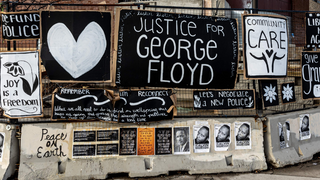The trial of Derek Chauvin, charged with second-degree murder, third-degree murder and second-degree manslaughter for the killing of George Floyd in May last year, is groundbreaking. This is the first televised trial in a Minnesota court room. The National Guard is activated. The world is watching. And with police and protestors clashing for a second night, the tension on the streets of Minneapolis is palpable.
As the prosecution’s case in the trial of Derek Chauvin nears its end, the piercing testimony of Minneapolis Chief of Police Medaria Arradondo is salient. While his testimony confirmed that Chauvin’s use of force violated department policy and has been lauded as a slam dunk for the prosecution, the unprecedentedness of the testimony is equally a reminder of systemic problems that make police testimonies like Arrandondo’s so rare.
This culture of cover-ups makes the successful prosecution of police brutality arduous and uncommon.
Prosecutors in police misconduct cases are known for coming up against the Blue Wall of Silence - a term used to describe the unspoken loyalty rule that sees police officers protect one another by providing false testimony, turning off body cameras, and refusing to cooperate with investigators when charges of misconduct are laid against their colleagues.
This culture of cover ups makes the successful prosecution of police brutality arduous and uncommon. While around 1,000 Americans are fatally shot by police annually, according to data collected to May 2020 only 110 law enforcement officers have ever been charged with murder or manslaughter, and only 42 have been convicted. The fact that Chauvin was brought to trial at all is considered exceptional.
Furthermore, as Brown University’s, Nicole Gonzalez Van Cleve points out, police officers and prosecutors are interdependent. Criminal prosecutors are reliant on police officers. They are the ‘star witnesses’ needed to make convictions and career wins. As such, many prosecutors are reluctant to bring cases against officers and will overlook criminal behaviour (like perjury) knowing the damage that revealing it may have on their future trials. Prosecutors are bound by the Blue Wall of Silence and the police rely on it to save them from misconduct charges. This skews the US police trials towards acquittal.
Less than 30 per cent of Australians view US race relations favourably, despite 64 per cent of Australians with European or Australian ancestry believing Indigenous Australians are "either lazier or less intelligent".USSC polling (2019)
The potential for Chauvin’s trial to lead to acquittal makes the existing unrest on the streets of Minneapolis highly flammable. Amid this week’s police shooting of Dante Wright, a 20-year-old Black man, Minneapolis is on high alert. Local officials have purportedly spent $1 million on security measures including barbed-wire fences, locked down the city’s centre, enforced curfews, and deployed the National Guard.
Watching on, Australians may be tempted to shake their heads in judgement of the United States. Polling conducted by the United States Studies Centre in 2019 revealed that less than 30 per cent of Australians view US race relations favourably. However, Australia cannot deny its similar tether to the critical underlying feature of the trial: racial prejudice.
The same USSC polling revealed that the vast majority of Australian respondents with European or Australian ancestry held prejudicial attitudes towards Indigenous Australians. Sixty-four per cent of Australian respondents with European or Australian ancestry believed that Indigenous Australians were either lazier or less intelligent than white people. For comparison, the same polling found that 38 per cent of white Americans believed that African-Americans were either lazier or less intelligent than white people.
Australia may have stricter gun laws, less instances of police brutality, and less extremes of wealth and poverty than the United States. But Australia is clearly not immune to prejudice and systemic injustice. With at least 474 Aboriginal and Torres Strait Islander deaths in custody since 1991 and never having successfully convicted a police officer for murder, Derek Chauvin’s trail should not open a window for Australia to pass judgement on the US but should hold up a mirror to our like shortcomings.






